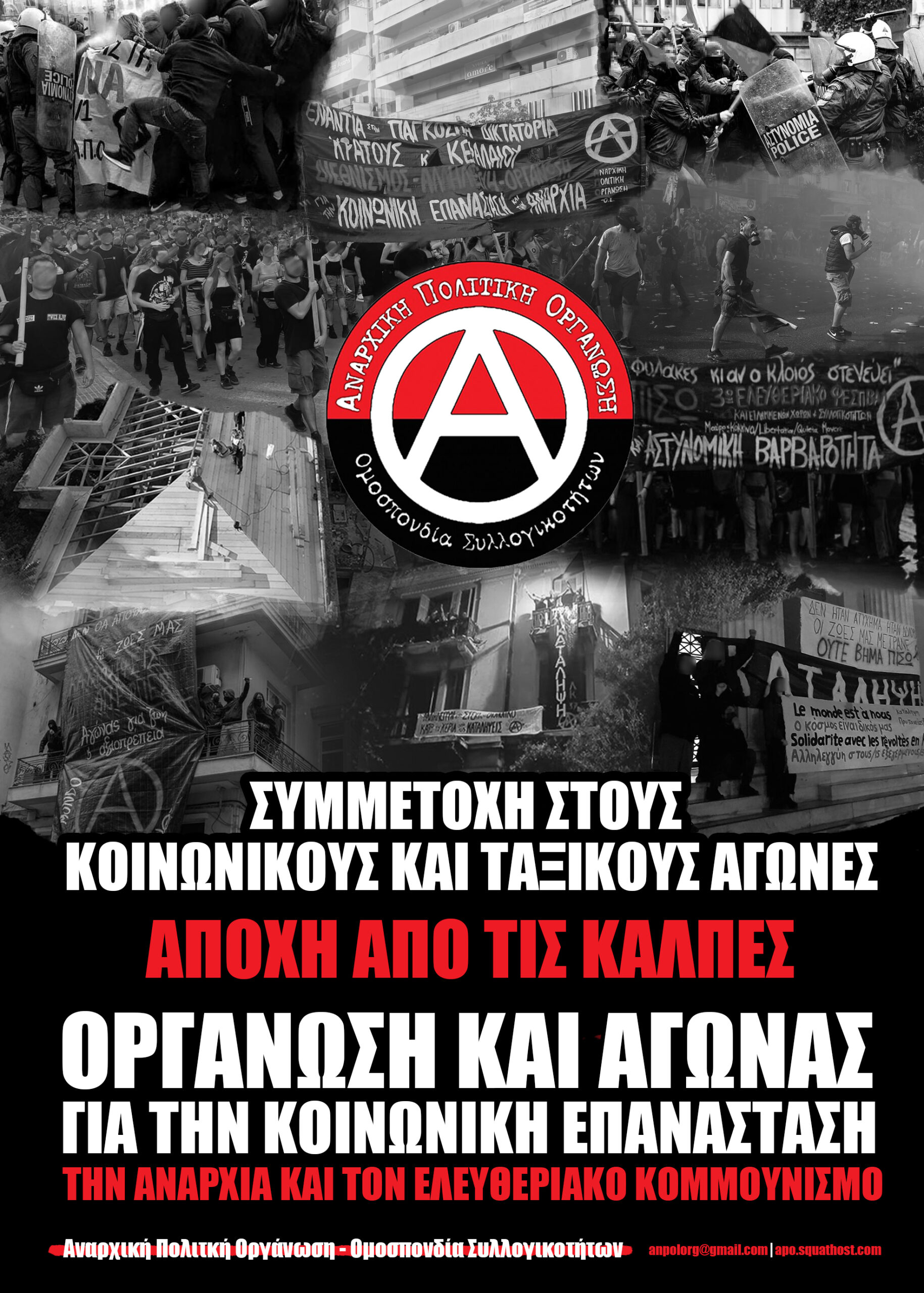On 21st May 2023, the right-wing New Democracy party won their re-election, ensuring more years of neo-liberal cuts to essential services, racist “pushback” against refugees and rising authoritarian crackdowns against Greece’s social movements. Even when taken together, the three major left-wing parties failed to beat the right, reflecting a generalised malaise within the ranks of the reformists.
Here we publish a statement from the Anarchist Political Organisation, who analyse the state of affairs and what can be done to move on from here.
No truce in the social and class war. No compromise in the face of state and capitalist barbarism.
A key element of contemporary totalitarianism, as expressed by the absolute domination of the state and capitalism in any social field, is the narrative that “there is no alternative”. Any narrative submitted to the political scene from the side of domination attempts to convince the social base of the inevitability of their absolute oppression and exploitation. In the discourse of domination, the elimination of human existence itself appears more likely than social liberation. At the same time, it is necessary to say how each party apparatus that attempts to take power will once again serve – as if could it do otherwise anyway – the interests of capitalists and how it will play its own role in modern totalitarianism, depending on the mask of governance that it sells. Property, the state, capitalism, the police, the army and all the sources of oppression and exploitation that make up the joints of this world cannot be undermined through the electoral process.
It is obvious that in the last four years we have seen a rabid attack on the social base and the gains of struggle unfold. After the period of the necrosis of the movements by the social democratic government of SYRIZA, the neo-liberal government came as the other side of the same coin to attack – from the very first moment – the conquests of the social and class struggles and first of all the structures of the anarchist movement. Furthermore, in the period of the pandemic it became apparent that the state apparatus was unable to manage any crisis that the system itself generated, and that the first concern of the authoritarian system was, is and always will be its fortification against social and class struggles and the imposition of imprisonment as the only measure of protection against the pandemic. Moreover, the degradation of human life in every social field continued. Whether we are talking about the attack on the world of work with the abolition of the eight-hour day, the increase in the cost of living through ever-increasing precision or even the attempt to change reality within universities (abolition of asylum, law 4777, university police) or finally the state and capitalist murder in Tempe, one thing is certain: within the framework of capitalism, human life is perceived as a means of profit production alone.
At this point, it is necessary to recognise the presence and the effectiveness of movements and resistances throughout this period. At no time has any speech within parliament or the parties in general been articulated in such a way that it is substantially opposed to state and capitalist barbarism. On the contrary, the radical struggles of the social grass-roots themselves, with the anarchist movement leading the way, have put forward both resistances and counter-proposals against oppression and exploitation. From the first public rallies against educational restructuring and the occupation of the rectorate of the Aristotle University of Thessaloniki, to the mobilisations in solidarity with the health workers and in solidarity with the hunger striker Dimitris Koufontina, which managed both to achieve victories in their respective fields and to challenge in practice the state management of the pandemic. In addition, the magnificent strikes of the workers of e-food and Cosco, Malamatina, Kavala oil and Kavala fertilizers, who attempted to put a stop to the further deterioration of working conditions and exploitation. Furthermore, the dynamic and sustained mobilisations of the students of the art schools who, armed with the occupation, set up barriers to educational restructuring. Finally, in the last period, through the occupation of the rectorate of the University of Athens, the major strike mobilisations and the reoccupation of Mundo Nuevo, it became clear how only the social base itself, the anarchist and radical movement, in the street, far from electoral illusions, put up mounds against state and capitalist domination in every social field.
The next period is crucial, as after a dense period of systemic attack and large mobilisations, domination attempts to narrate a new normal. It posits as its main narrative the normality, the immutability of the existing system of power and exploitation. And it calls on the plebs to adapt to precision, the rising cost of living, the intensification of repression, the attack on labour gains, the growing threat of a generalised war conflict starting with the invasion of Ukraine by the Russian army and the ever-intensifying inter-capitalist and inter-imperialist antagonisms of NATO and Russia.
In the coming period we will have to participate even more dynamically in all the fields where primary resistances are emerging, to extend the influence of the anarchist resistance discourse to the impoverished sections, to build new social alliances with the oppressed. It is necessary in the present day to intensify the organized intervention of anarchists, from schools and universities to workplaces and neighbourhoods. To demonstrate in a tangible way how participation in the ranks of the organized anarchist movement is the only solution to today’s oppression and exploitation of man by man. To build a mass anarchist movement that will set both roadblocks to the onslaught of the state and capital, as well as roadblocks to the society of tomorrow.

